SUMMARY
This is AI generated summarization, which may have errors. For context, always refer to the full article.
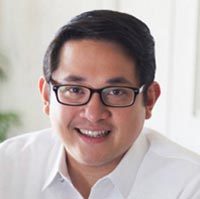
I can still remember being in the student council in the ‘90s talking to student leaders who had come before us.
According to them, times had changed. Our generation was more apathetic, more concerned about material things and less willing to sacrifice for a better Philippines.
They were, after all, the student leaders that endured the tail end of Martial Law and marched on EDSA. They were student leaders who lived and served through more exciting times, when stakes were higher.
Sound familiar?
Is this how every preceding generation feels when it’s time to pass on the baton to the younger set?
Hopefully with this article, I will buck this trend and instead of talking about how millennials are the selfie-obsessed generation, I will share why I am confident our youth will make this country, maybe even the world, a better place.
1. Millennials can handle change
We live in the world of artificial intelligence (AI), self-driving vehicles, robotics, the internet of things (IoT), 3D printing, and so many other technological advancements that were mere science fiction to many of us some years ago.
It’s a rapidly changing world that inspires events like the upcoming OCEAN16 (Open Collaboration with East Asia New Champions) Conference, a biennial gathering happening on Nov. 24 to 26 in Bohol, that brings together multi-sectoral leaders to connect, discover new ideas, and shape a more creative and innovative future together.

We are in the midst of the “Fourth Industrial Revolution,” what World Economic Forum founder Klaus Schwab calls the “fusion of technologies that is blurring the lines between the physical, digital, and biological spheres.”
And while older generations are still starting to make sense of these new realities, Millennials are “early adopters” who dive headfirst into these technologies and help us unlock its possibilities.
I am reminded of a young Filipino innovator named Matthew Cua and his multi-award-winning company, SkyEye. Matt and his team took the popular technology of “drones”, which is more popularly used to take photos and videos for creative content, and instead used them for aerial mapping, property surveying, and similar services. This year, SkyEye worked with the World Bank to identify areas in the Philippines that need to be prioritized for road construction.
2. Millennials navigate through chaos and are “G” to take risks
Let’s face it: change can get messy. And the mess gets even more complicated when it’s amplified on social media and multiplied by millions of other voices. It’s sometimes easier to just tune out of all the noise than to dive into it and separate what’s worth tackling and what’s not.
Millennials, however, are undeterred. In a recently-released study by communications firms McCann Worldgroup Philippines, called The Truth About Youth, it was said that “96% of Filipino youth feel that we all have a responsibility to make a positive contribution to the community we live in (vs. 89% globally).” That study called Filipino youth, “community-driven activists.”

That same study said that “Young people want agility and responsiveness when it matters.” Millennials are impatient and want quick answers—yes—but perhaps that is the key to also making positive change happen in our communities.
What comes to mind here is the civic organization called Bantay.ph. Using the Anti-Red Tape Act (ARTA) as its legislative springboard, the group uses technology to monitor government services at the local government (LGU) level, and allows users to rate their LGU in terms of compliance, transparency, facilities, process flow, and officers.
Bantay.ph even has a “fixer alert” that identifies if fixers were “spotted and/or reported lurking around in the city hall.” It also works with Contact Center ng Bayan to allow people to report cases of poor governance through the website or a simple telephone number: 1-65-65.
Our office has been supportive of Bantay.ph and we look forward to cutting more red tape and promoting a culture of efficiency in our government through the Government Efficiency Office Act or Senate Bill No. 348.
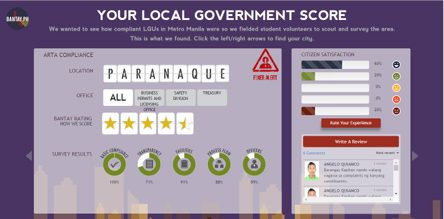
3. Millennials navigate through highly connected networks
For a country of 101 million people, we have over 119 million mobile phone subscriptions. A multi-screening, “mobile-first” nation, we spend up to three hours (possibly even more) each day on our mobile screens, and over 55% of Filipinos have a mobile broadband subscription.
We’re probably the most hyper-connected country in the region, but because we’re also one of the most disaster-prone and climate-vulnerable countries in the world, Filipino Millennials have put our connectivity to good use beyond typical business and social needs.
#RescuePH, for example, uses the power of social media and crowdsourcing to report and monitor those who need rescuing in times of natural disasters.
There is also Project Agos, a platform that uses the web, mobile technologies, and social media to help people prepare for and respond to natural disasters. A multi-sectoral effort launched in 2014, Project Agos releases geo-hazard maps and enables people to report disasters in order to direct help to where it is most needed.
I’m also inspired by the example set by Young Pioneer Disaster Response, a non-profit organization established in Bantayan Island, Cebu, to provide ongoing rehabilitation efforts since Bantayan had been severely affected by Supertyphoon Yolanda in 2013. From an empty plot of land, YPDR put up a bamboo factory that now creates bamboo cups for a pizza brand named Isla Ora Pizza Co and also builds bamboo homes for Yolanda survivors. It’s a great way to combine social media, analog technologies (such as bamboo), and Pinoys’ love of food to fuel disaster response efforts.
4. Millennials care about the environment and sustainability
When we speak of natural disasters and climate vulnerability, we also need to address the sustainability of our planet, our country, and our communities.
As a member of the World Economic Forum and OCEAN communities, I am proud to see that many Filipino Millennials from these communities have committed themselves to addressing some pressing issues that affect the earth and the way we live in it. These include Anna Oposa of Save Philippine Seas, a movement that works on marine conservation through information, education, communication activities, and community-based projects; Cherrie Atilano of Agrea, a Marinduque-based social enterprise that promotes sustainability by ensuring that farmers and fisherfolk are treated with dignity, as critical players in our supply chain.
I am also inspired by Rachel Villa of Cropital, an innovative crowdfunding platform that allows people to grow their money by providing small, bankable loans to farmers. There are also the likes of young Filipino inventors Aisa and Raphael Mijeno of SALt (Sustainable Alternative Lighting), the sibling tandem who developed a sustainable lamp made out of saltwater ; and Amin Hataman, the Basilan-based, 15-year old inventor who created biodegradable plastic made of the coconut by-product, nata de coco. (Source: http://www.rappler.com/move-ph/issues/mindanao/124045-basilan-forbes-young-scientist-amin-hataman-biodegradable-bags)
They all prove that youthful ideas, when combined with the heart for the environment and the right technologies, can make a huge impact on the future of our country and our planet.
5. Millennials are passionate about purpose
Contrary to what other generations think, young people are not always self-obsessed. There are many out there who use their knowledge, skills, and talent to lift up other people and create communities of change.
In the same McCann youth study, it was revealed that “92% of young people in the Philippines believe that global brands have the power to make the world better.” Here at home, there are already some young entrepreneurs who are using the power of great design and brand-building to directly empower communities while producing products that people want to buy.
These include Reese Fernandez-Ruiz of Rags2Riches, a social enterprise that turns rags into upscale bags and home accessories, now available in many parts of the world; Bryan McClelland of Bambike, a social enterprise that hand-makes bamboo bicycles with fair-trade labor and sustainable building practices; Anya Lim of Anthill Fabric Gallery, a fashion retail brand that makes it chic to wear our own indigenous weaves and patterns; and Koh Onozawa of Loudbasstard the eco-friendly bamboo speaker amplifier that made the world sit up and take notice of ingenious, Filipino product design.
Challenge of empowering the Millennial Generation
The examples above barely scratch the surface of the great work that’s already being done by Filipino Millennials butwe also know that there are two sides to a coin—that social media and technology come with their own pitfalls and dark corners that may put some of our youth at risk.
For instance, we know for a fact that trolls and cyberbullies exist, and that there is now the proliferation of fake news sites and a lot of paid, false propaganda that prey on the innocence of our youth.
McCann’s Truth About Youth also reveals that 22% of the Filipino survey respondents said that they had written negative comments online about people they knew. This puts our Filipino Millennials above the global average of 16%.
How are we going to deal with this as a community? How are we going to ensure that the youth’s strengths are harnessed, while protecting them from influences that seek to make them more cynical, even hateful?
More than protecting our youth, I’m a firm believer in empowerment and giving people the tools and proper support to overcome challenges on their own.
In the case of social media, we filed a senate resolution on responsible social media use and recently conducted a senate hearing with the Department of Education to explore the role of our schools and education system in combating misinformation and cyberbullying.
For our Millennials who endeavor to make a difference through social enterprises and progressive businesses, we’ve passed laws in support of local businesses and continue to file bills to encourage start-ups and social entrepreneurship.
We’ve filed the Innovative Start-up Act, the PRESENT Bill, and the Inclusive Business Act, among others, to create an enabling environment for young entrepreneurs raring to improve communities through enterprise.
The Youth Entrepreneurship Act has already been passed into law and mandates the inclusion of, not only financial literacy, but also entrepreneurial training and the introduction of social enterprise development in our basic education in the hopes of molding the conscientious Filipino businessmen of the future.
There is so much potential in the Filipino youth. The McCann youth study says that 91% of Filipino youth agree with the statement, “It is important to be inclusive and welcoming to all kinds of people.” The study also shows how “younger people are far more focused on social equality,” paying attention to issues such as racial and gender equality, and even LGBTQ rights and transgender issues.
Filipino Millennials also over-indexed when it came to talking about leaving a legacy, with 26% of them saying, “I’d like to be remembered as a person who changed the world in a positive way.”
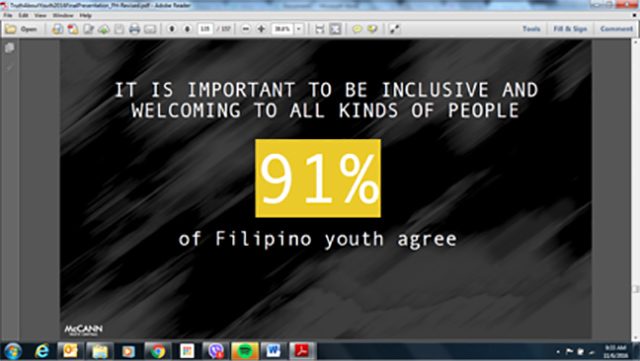
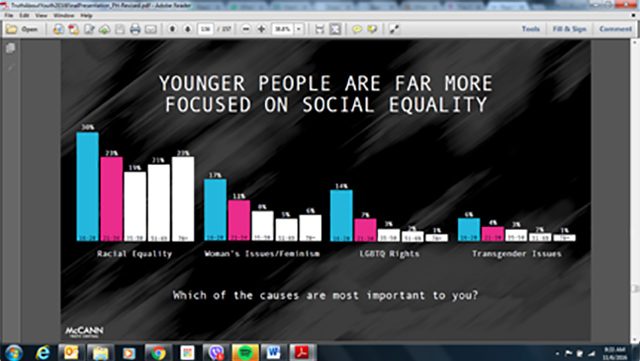
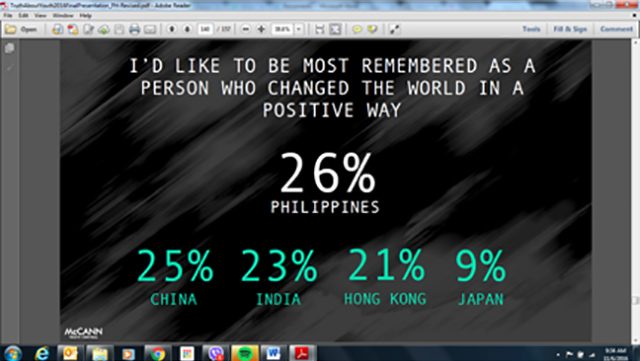
Clearly, there is a desire and a drive among young Filipinos to create a better world.
With our trust and support, I am hopeful that our millennials will not only stand up for the values and ideals that they hold dear by speaking out on social media and trending hashtags, but also through relentlessly pursuing positive change in the real world. – written with Niña Terol and Janine Ramirez/Rappler.co
Add a comment
How does this make you feel?
There are no comments yet. Add your comment to start the conversation.